Flame detectors are key to an effective fire suppression system, according to Nishant Thankappan, business development manager – analytical and detection, Emerson Automation Solutions
Combustion creates electromagnetic emissions across a wide range of wavelengths. This spectrum is typical of hydrocarbon combustion. (Image source: Emerson Automation Solutions)
The first step to battling a blaze is recognising when it is happening through selecting and applying the right detectors for spotting flames, with little to no false alarm conditions.
Fire detection and prevention can be carried out immediately before incidents escalate with effective safety systems and personnel training
Visual flame detectors employ a charged couple device (CCD) image sensor and flame detection algorithms. The imaging algorithms process live video images from the CCD array and analyse the shape and progression to discriminate between flame and non-flame sources. Unlike IR or UV flame detectors, CCTV visual flame detectors do not depend on emissions from carbon dioxide, water, and other combustion products to detect fires.
Emerson’s Rosemount 975 Flame Detector family offers a wide range of sophisticated flame detectors. Rosemount 975MR MultiSpectrum Infrared detects hydrocarbon fuel and gas fires at long distances and provides the highest immunity to false alarms. Rosemount 975HR MultiSpectrum Infrared for Hydrogen offers the combined capability to detect hydrocarbon and hydrogen fires. Rosemount 975UR Ultraviolet Infrared Dual UV and IR detector is suitable for detecting flames produced by clean-burning hydrocarbon fuels.


